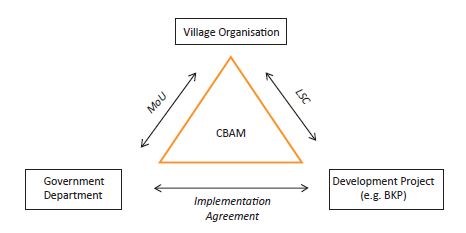Community-based implementation of EbA measures
Triangle of Cooperation (LCS = Local Subsidy Contract)
GIZ
Adaptation measures were implemented via a multi-stakeholder process involving communities, government institutions and the project. This innovative mechanism for demand-driven and integrated planning and implementation of field measures was termed ‘Triangle of Cooperation’ (see graphic). The BKP project funded adaptation measures through local subsidy contracts (LSC) with the community, which had to form a village organisation registered with the Social Welfare Department, and open a bank account. To receive support, the community had to enter into an agreement (memorandum of understanding, MoU) with the concerned government department to specify their roles and responsibilities. While the community was responsible for the implementation of the adaptation measures, the involved government department provided training and oversight.
• Strengthening village-based organisations for appropriate involvement of women considering local norms / traditions
• Formalizing cooperation between the community and the supporting institution (government, NGO, development project)
• Practical demonstrations
• Monitoring and evaluation involving the local communities
• Capacity building of the community to ensure the successful completion of activities as well as to carryout out follow up activities beyond the project’s support
For further promotion of biodiversity conservation to support local communities in climate change adaptation, the different tools introduced by the project, such as training, workshops, exposure visits to promising communities and institutions, use of print and electronic media etc., have to be used continuously, taking into account local culture and norms.
In general, the government allocates only a meagre amount of funds for the green sector. In cases, the budget allocated is more for the staff salaries than for the field level activities. Sufficient budgetary allocations to the green sector for biodiversity friendly adaptation measures should therefore be guaranteed by the government, to replicate the best adaptation measures on a needs-basis.
For sustainability the responsible government agencies should support the local communities in future activities

